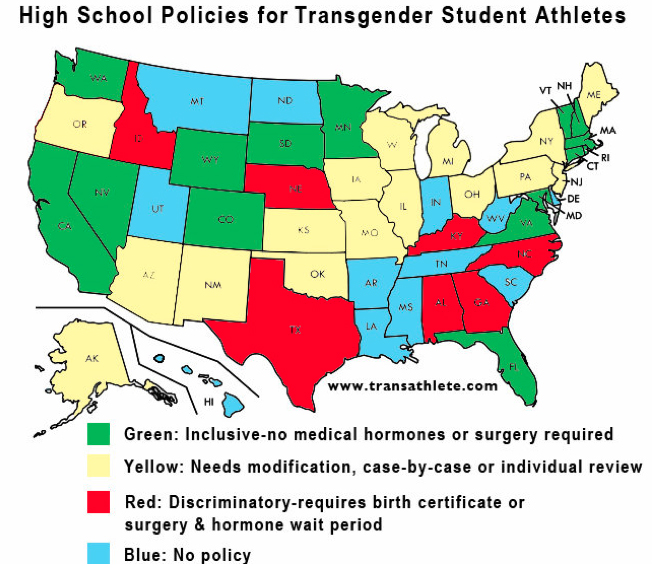
Christopher Futcher/iStock
Robby Dyas didn’t play very much as a freshman on Lincoln High School’s softball team. The shortstop got a concussion from a pop fly early in the season, and spent the following weeks learning “a lot about the strategic side” of the game from the bench. After that, Dyas was done with softball.
The Nebraskan teen was also done living as a girl: Junior year, Dyas came out as transgender and began using male pronouns and the name Robby. But the longtime athlete—who’d competed in taekwondo, basketball, wrestling, and softball as a kid—never got to pitch overhand. “I just remember getting a rude comment about girls playing on the baseball team,” he recalls.
This year, transgender teens may have a better shot at high school sports in Nebraska: The state’s new policy allows trans girls and boys to compete on teams corresponding with their gender preference. But before they can do that, they’ll have to prove to a four-member Gender Identity Eligibility Committee that they’re “consistently” transgender. Trans girls will have to undergo sex reassignment surgery or a year of hormone therapy to play.
Nearly 40 states have adopted policies for high school transgender athletes. Some allow students to play on teams based on gender identity, without any kind of hormone requirement, while others restrict them to teams matching the sex on their birth certificates. Nebraska’s policy takes a middle road—and has fueled outrage on all sides. It also comes at a time of national debate over trans rights in schools. Nearly half of all states are currently suing the Obama administration over whether Title IX, a law that prohibits sex discrimination in federally funded schools, should protect trans kids, too. While that legal battle centers on questions of bathroom access, experts say it could also affect athletic participation.
In the crosshairs will be kids like Robby Dyas and Asher Wells, another trans boy at Lincoln High. Wells takes gym classes during summer school instead of the regular academic year so he can avoid the girls’ locker room. When I first spoke to him, he was pondering whether to try out for the boy’s tennis team before he graduates.
It might be simpler if Asher were just a few years older. In college, the aspiring tennis player would probably get to choose whether to try out for the men’s team or the women’s team, without having to brave any gender committees; that’s because the NCAA, which makes rules for college sports at universities around the country, came up with a policy for trans athletes back in 2011. Trans men who take testosterone—to appear more masculine—can only play on men’s teams, since the hormone has been linked with muscle mass. Those like Asher, who aren’t taking testosterone, can play on whichever team they prefer. And trans women, born with male bodies, need to medically suppress their natural testosterone levels if they want to compete against other women. (In January, the International Olympic Committee updated its policy to include similar regulations.)
At first, many high schools followed the NCAA’s lead. Some hadn’t given much thought to creating their own policies, because until recently they “really hadn’t had a lot of kids come up through the school ranks identifying as transgender,” notes Karissa Niehoff, executive director of the Connecticut Association of Schools, whose policy for trans athletes once mirrored the college guidelines. Then her association, like some in other states, changed its tune, perhaps realizing that college and high school sports aren’t the same—different ages, different goals. Connecticut ditched its hormone-based policy in 2013 and adopted more inclusive rules, allowing kids to play based on their self-identification as male or female.
Pat Griffin, a professor emerita at the University of Massachusetts-Amherst who helped develop the NCAA’s hormone-based policy, supports that kind of move. High schoolers shouldn’t have to take hormones, she says, because at that age, “most students are playing to participate.”
But absent a national governing body, high school guidelines vary widely. In Texas, a new rule prohibits students across the state from participating on teams that don’t match up with the sex on their birth certificates. On the other hand, in 2013 California became the first state to pass a law allowing trans students to play on teams matching their gender identity, no hormone therapy required; about 15 states now have similar policies. A handful of other states require trans girls to take hormones for a year before playing on girls’ teams. (See map below.)

In Nebraska, the school athletics association had never been able to pass an athletic policy for gender-nonconforming kids, in part due to the state’s deeply conservative roots. Then in 2015, two schools alerted the Nebraska School Activities Association about some trans students who wanted to compete on winter sports teams, so the NSAA decided to take up the issue again.
In January this year, the NSAA announced its big idea: A Gender Identity Eligibility Committee will make decisions on a case-by-case basis for trans student athletes who want to play on teams matching their gender identity. The committee—made up of a doctor with experience in trans health care, a mental health professional, a school administrator, and an NSAA staff member—will consider testimony from the student’s parents, friends, and teachers, plus medical documentation, to make sure the student consistently identifies as transgender. It will also require trans girls to have sex reassignment surgery or a year’s worth of hormone therapy to reduce testosterone levels. And to play on a team, a student will need unanimous approval from the committee.
The backlash came quickly, with critics on the left decrying the gender review process as burdensome. “They have essentially put up a sign that transgender students need not apply,” said Amy Miller, a legal director for the ACLU. For starters, critics say, many teenagers don’t want to go on hormone therapy. “It’s expensive, it’s a lot of effort, it’s like going through puberty again,” says Dyas. And the idea of proving your gender to a group of strangers can be intimidating: “I would not be comfortable with that,” says Dyas, who organized a protest against the policy at the state Capitol with a handful of trans-rights supporters.
Critics on the right worry the policy makes it too easy for trans kids to compete. “As the father of two daughters, I would be very concerned about boys competing against my daughters in sports,” Republican Gov. Pete Ricketts said. The Nebraska Catholic bishops weighed in, too, noting that “this would certainly have a negative impact on students’ and society’s attitudes towards the fundamental nature of the human person and the family.”
Another concern is competitive advantage. When a trans girl raced in a high school track and field state championship in Alaska in May, protesters showed up at the track. “Allowing students to play on teams of the opposite sex disproportionately impacts female students, who will lose spots on a track, soccer and volleyball teams to male students who identify as female,” said Jim Minnery, president of the conservative group Alaska Family Action. Karissa Niehoff, of the Connecticut Association of Schools, says signs of a competitive advantage haven’t come to fruition in her state since it dropped its hormone-based policy for trans teen athletes.
Susan Cahn, a professor at the University at Buffalo who wrote Coming on Strong: Gender and Sexuality in Twentieth-Century Women’s Sport, can understand why female athletes might be wary about trans competitors. “Historically, girls and women have been the disadvantaged group, and they’ve been kept out of sports or haven’t been given the same kinds of training or resources,” she says. But trans kids are a disadvantaged group, too, who often put up with bullying and discrimination, she points out.
And even when we segregate sports by sex, certain kids have physical advantages. For boys’ sports, “if you look at a 9th- or 10th-grade team, you’ve got these little kids who haven’t hit puberty yet, and these giant kids, boys who have totally hit puberty. They have completely different bodies, and no one says they shouldn’t play together,” she explains. What’s more, a kid can have an upper hand for reasons unrelated to sex, like if his family has enough money to pay for summer training camps or traveling teams with the best coaches. Of all the different types of advantages, she says, testosterone is not the most critical, especially for teenagers, “so to fixate on that one is really about the politics of gender and not actual bodies.”
And the politics of gender—or rather, gender identity—have reached a fever pitch, not only in Nebraska, but on the national stage. In May this year, the US Department of Education sent a letter to public schools across the country, saying they could lose federal funding if they discriminated against transgender students. The letter made waves for its guidance on bathroom access—it said trans kids should be allowed to use facilities of their choice. It also called on schools to allow transgender kids to play on sports teams matching their identity, notes Sarah Axelson, a Title IX expert at the Women’s Sports Foundation.
Leaders in many states saw this letter as an overreach. So they turned to the courts. Now, Nebraska and 22 other states are suing the Obama administration, arguing that it has interpreted Title IX too broadly by including protections for transgender kids. On August 21, a federal judge in Texas ruled in their favor, granting a nationwide injunction that temporarily blocks the Obama administration from enforcing the recommendations in its letter about transgender rights. The administration is expected to appeal. Meanwhile, the US Supreme Court is considering whether to take up a separate case about whether Title IX protects transgender students. Griffin, who helped develop the policy for trans college athletes, says she suspects that if Nebraska and other states prevail in their legal fight with the Obama administration, it will affect not only bathroom access, but sports participation.
Nebraska’s new athletic policy, adopted before this legal drama unfolded, says trans athletes have to use bathrooms and locker rooms corresponding with their birth sex or, when possible, a private facility—even if they qualify to play on teams matching their preferred gender.
“You’ve fought and you’ve fought to be able to play on the sports team,” Dyas says in response to this caveat. “And finally you’re allowed to be the boy, you’re allowed to have everything you’ve ever wanted. And then right then and there, they rip it all out of your hands and are like, ‘But actually you can’t even use the locker room.'”
Jim Tenopir, the head of Nebraska’s high school athletics association, acknowledges that this rule “flies in the face of” the Obama administration’s guidance but aligns closely with the state of Nebraska’s position on protecting the privacy rights of other kids.
Asher Wells just started his junior year at Lincoln High. He’d been considering whether to try out for the boys’ tennis team this year, but in the end he decided against it. Even if he were good enough, he worries the Gender Identity Eligibility Committee wouldn’t approve his application, he says. “And I would have to get a school physical exam, and I haven’t done that because I feel uncomfortable.” He’s also nervous about getting bullied during matches at other schools. “I’ll think about it for next year,” he says.
As executive director of the NSAA, Tenopir says he intended to create an athletic policy that gave all Nebraskan kids a chance to compete, regardless of gender identity: “Although there may be some steep hills that a transgender student has to climb to be eligible to participate, at least that opportunity is there.”
Tenopir acknowledges that high school “is probably a borderline age for kids to consider” hormone therapy. But he adds that the policy would have never been approved without this requirement—given the political muscle of right-leaning critics who argued that trans girls would otherwise have an unfair advantage. “You don’t begin to have an idea what conservative values are until you get to a place like Nebraska,” he says.
As the school year kicks off, it’s unclear when the state’s new Gender Identity Eligibility Committee will be put to the test—Tenopir says that so far, not a single transgender student has applied.















